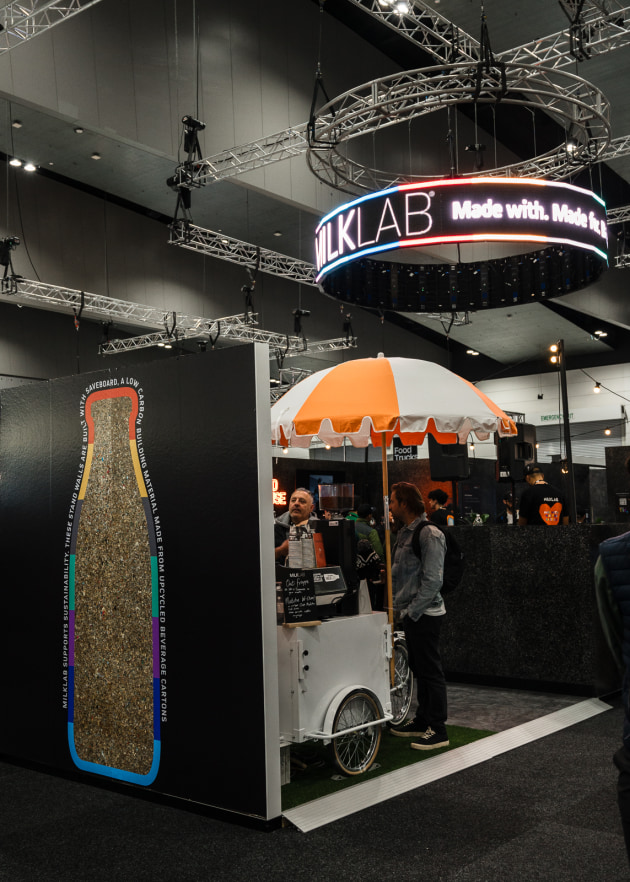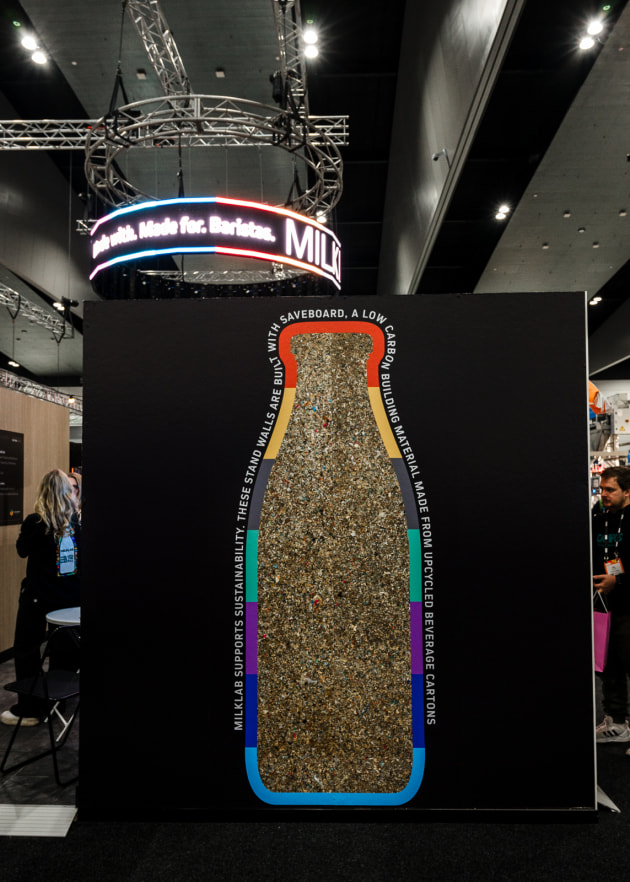Milklab, producer of plant-based dairy milks for baristas, used its stand at the Melbourne International Coffee Exhibition (MICE) to successfully showcase a sustainable building material made from recycled waste, including long-life milk cartons and coffee cups.

The new-look Milklab Lane stand at MICE incorporated exterior hole-in-the-wall style cafes and coffee carts that encouraged guests to explore ad discover the “laneways of Milklab”.
For the first time, Milklab’s stand was made with sustainable materials including saveBOARD – a low carbon building material made from hard-to-recycle liquid paper board used in long-life milk and juice cartons.
saveBOARD is focused on building a circular economy by turning composite packaging waste – such as milk cartons, ingredients bags, coffee cups and soft plastics – back into low-carbon products that re-enter the local supply chain, therefore eliminating future waste.
Milklab worked closely with saveBOARD to create circular economy solutions for the walls of Milklab Lane by integrating milk carton packaging waste into the board products.
The company says there are no additives such as glues, chemicals and adhesives in the boards. The plastic in the packaging is the glue, and the colour is created from the original consumer packaging.
Each board saves 500 used beverage cartons from landfill, with each saveBOARD plant capable of recycling four million kilograms of soft plastics and fibre every year at its facilities at Warragamba in Western Sydney and Hamilton in New Zealand.
Natalie Latimore, marketing manager at Milklab, said that following the success of the Milklab Lane at MICE, there are plans to roll-out the sustainable stand at other trade events.
“Sustainability is important to Milklab, so we are committed to implementing sustainable practices in our products, our processes and our packaging,” Latimore said.

“We are excited to partner with saveBOARD to use upcycled milk carton packaging for the build of Milklab Lane to offer our customers an exciting and sustainable brand experience with a reduced environmental impact.”
According to Chris Collimore, saveBOARD’s country manager, said saveBOARD was a true solution to problematic waste management, and the company was proud to partner with Milklab to showcase its products.
“We divert hard to recycle packaging waste from landfill and turn it into an aethestically pleasing, functional and commercially sustainable building product,” explained Collimore.
“We then can recycle that product again and again back into saveBOARD. Supporting saveBOARD really is a circular solution to waste.”
Earlier this year, saveBOARD opened its new Warragamba beverage carton manufacturing facility in partnership with Tetra Pak, one of the suppliers of cartons for Milklab’s range of barista milks.
Jaymie Pagdato, marketing director at Tetra Pak, said the company is incredibly proud of the ongoing partnership between Tetra Pak and saveBOARD, keeping valuable resources out of landfill, preserving our planet’s resources, and reducing waste to create sustainable building materials from used cartons for the local market.
“Through this collaboration, we are not only creating value through the lifecycle of every carton, we are also contributing to a low-carbon circular economy,” Pagdato concluded.





